A Self-Reflective Paper on Nursing Values and Research Experience
VerifiedAdded on 2023/04/22
|11
|3177
|358
Essay
AI Summary
This essay is a self-reflective exploration of a nursing student's values, attitudes, and beliefs in the context of nursing research and practice. It begins by discussing the importance of values such as altruism, autonomy, and human dignity in guiding nursing research. The author emphasizes the role of quantitative research in evidence-based practice while acknowledging the significance of qualitative research for understanding patient perspectives. The essay further delves into the experience of exploring grief as a researcher, highlighting the importance of empathy and therapeutic relationships in providing holistic care to grieving individuals. The author reflects on personal experiences and the impact of grief on psychological well-being. Finally, the essay analyzes two scholarly articles with opposing viewpoints on empathy, ultimately aligning with the perspective that empathy and compassion are essential for improving care in nursing. The student also reflects on how past papers and solved assignments on websites like Desklib can aid in understanding such complex topics.
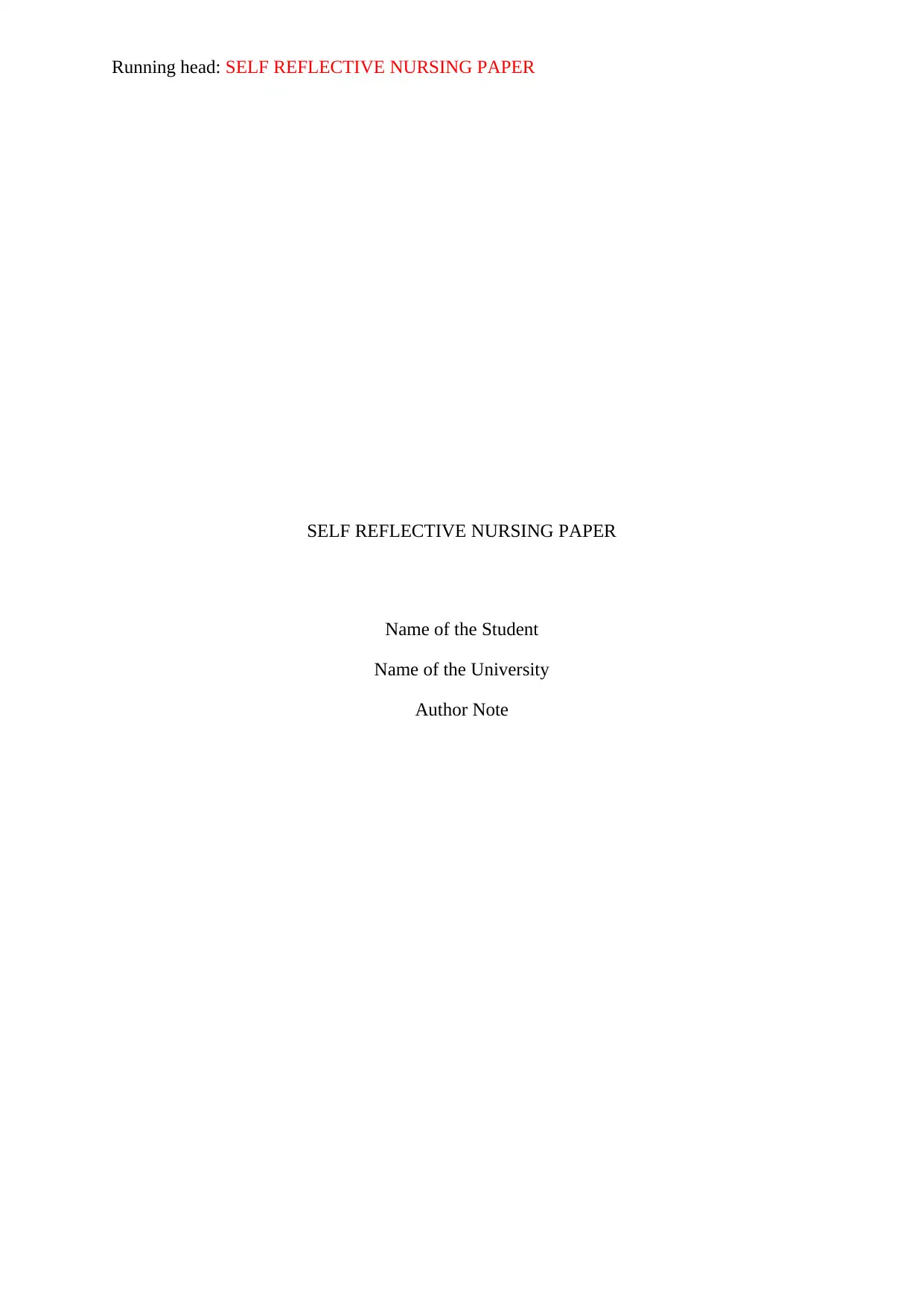
Running head: SELF REFLECTIVE NURSING PAPER
SELF REFLECTIVE NURSING PAPER
Name of the Student
Name of the University
Author Note
SELF REFLECTIVE NURSING PAPER
Name of the Student
Name of the University
Author Note
Paraphrase This Document
Need a fresh take? Get an instant paraphrase of this document with our AI Paraphraser
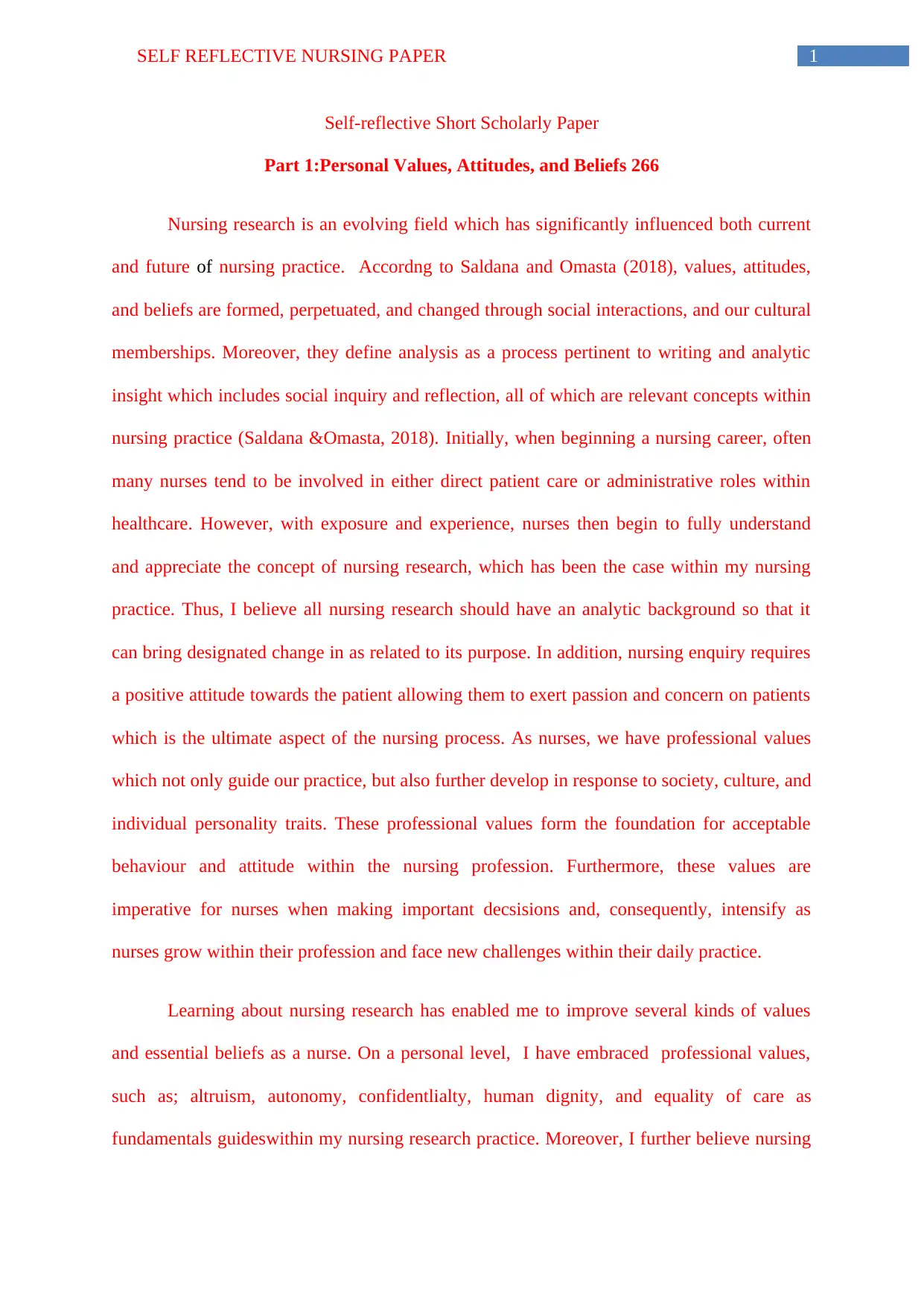
1SELF REFLECTIVE NURSING PAPER
Self-reflective Short Scholarly Paper
Part 1:Personal Values, Attitudes, and Beliefs 266
Nursing research is an evolving field which has significantly influenced both current
and future of nursing practice. Accordng to Saldana and Omasta (2018), values, attitudes,
and beliefs are formed, perpetuated, and changed through social interactions, and our cultural
memberships. Moreover, they define analysis as a process pertinent to writing and analytic
insight which includes social inquiry and reflection, all of which are relevant concepts within
nursing practice (Saldana &Omasta, 2018). Initially, when beginning a nursing career, often
many nurses tend to be involved in either direct patient care or administrative roles within
healthcare. However, with exposure and experience, nurses then begin to fully understand
and appreciate the concept of nursing research, which has been the case within my nursing
practice. Thus, I believe all nursing research should have an analytic background so that it
can bring designated change in as related to its purpose. In addition, nursing enquiry requires
a positive attitude towards the patient allowing them to exert passion and concern on patients
which is the ultimate aspect of the nursing process. As nurses, we have professional values
which not only guide our practice, but also further develop in response to society, culture, and
individual personality traits. These professional values form the foundation for acceptable
behaviour and attitude within the nursing profession. Furthermore, these values are
imperative for nurses when making important decsisions and, consequently, intensify as
nurses grow within their profession and face new challenges within their daily practice.
Learning about nursing research has enabled me to improve several kinds of values
and essential beliefs as a nurse. On a personal level, I have embraced professional values,
such as; altruism, autonomy, confidentlialty, human dignity, and equality of care as
fundamentals guideswithin my nursing research practice. Moreover, I further believe nursing
Self-reflective Short Scholarly Paper
Part 1:Personal Values, Attitudes, and Beliefs 266
Nursing research is an evolving field which has significantly influenced both current
and future of nursing practice. Accordng to Saldana and Omasta (2018), values, attitudes,
and beliefs are formed, perpetuated, and changed through social interactions, and our cultural
memberships. Moreover, they define analysis as a process pertinent to writing and analytic
insight which includes social inquiry and reflection, all of which are relevant concepts within
nursing practice (Saldana &Omasta, 2018). Initially, when beginning a nursing career, often
many nurses tend to be involved in either direct patient care or administrative roles within
healthcare. However, with exposure and experience, nurses then begin to fully understand
and appreciate the concept of nursing research, which has been the case within my nursing
practice. Thus, I believe all nursing research should have an analytic background so that it
can bring designated change in as related to its purpose. In addition, nursing enquiry requires
a positive attitude towards the patient allowing them to exert passion and concern on patients
which is the ultimate aspect of the nursing process. As nurses, we have professional values
which not only guide our practice, but also further develop in response to society, culture, and
individual personality traits. These professional values form the foundation for acceptable
behaviour and attitude within the nursing profession. Furthermore, these values are
imperative for nurses when making important decsisions and, consequently, intensify as
nurses grow within their profession and face new challenges within their daily practice.
Learning about nursing research has enabled me to improve several kinds of values
and essential beliefs as a nurse. On a personal level, I have embraced professional values,
such as; altruism, autonomy, confidentlialty, human dignity, and equality of care as
fundamentals guideswithin my nursing research practice. Moreover, I further believe nursing
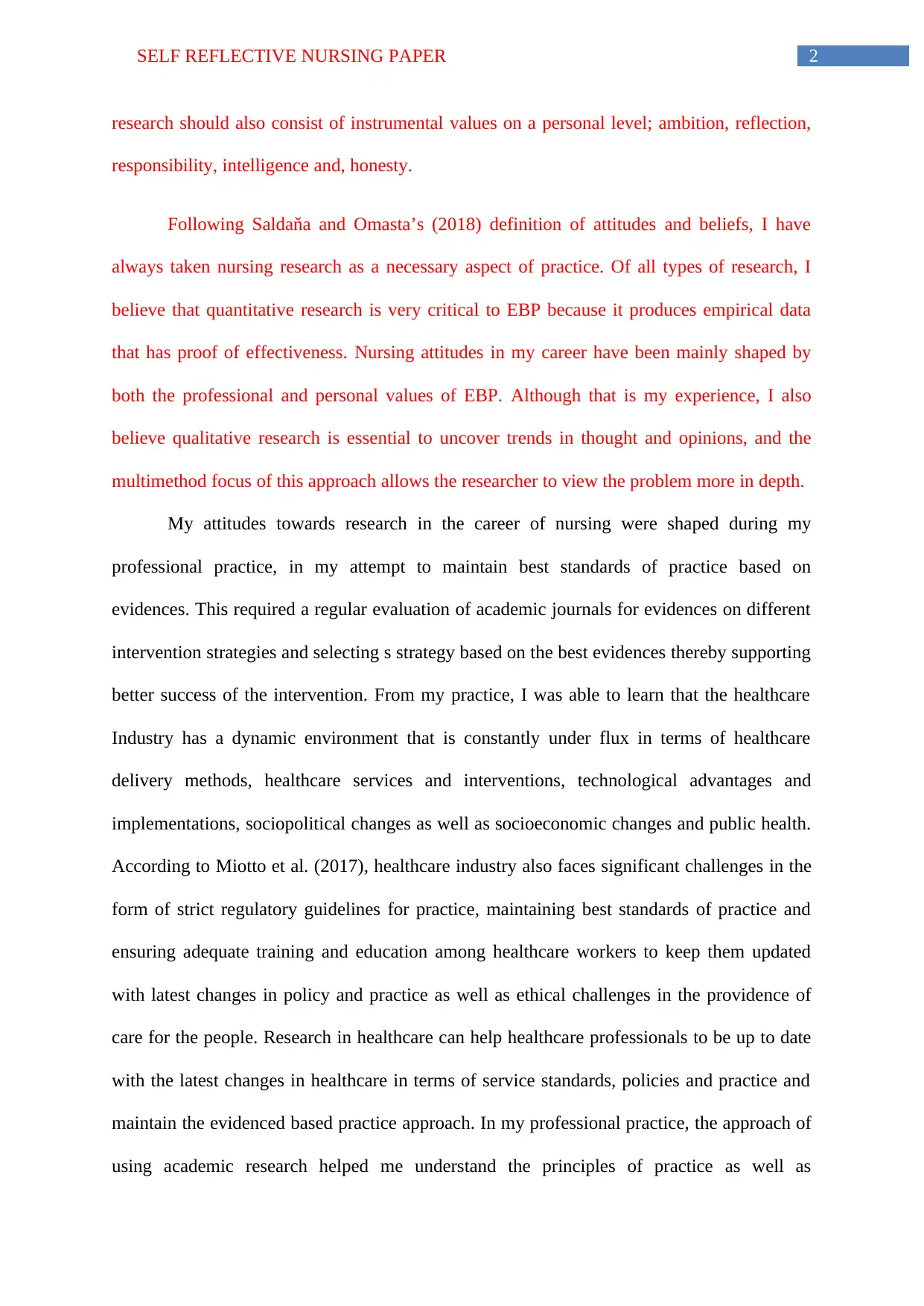
2SELF REFLECTIVE NURSING PAPER
research should also consist of instrumental values on a personal level; ambition, reflection,
responsibility, intelligence and, honesty.
Following Saldaňa and Omasta’s (2018) definition of attitudes and beliefs, I have
always taken nursing research as a necessary aspect of practice. Of all types of research, I
believe that quantitative research is very critical to EBP because it produces empirical data
that has proof of effectiveness. Nursing attitudes in my career have been mainly shaped by
both the professional and personal values of EBP. Although that is my experience, I also
believe qualitative research is essential to uncover trends in thought and opinions, and the
multimethod focus of this approach allows the researcher to view the problem more in depth.
My attitudes towards research in the career of nursing were shaped during my
professional practice, in my attempt to maintain best standards of practice based on
evidences. This required a regular evaluation of academic journals for evidences on different
intervention strategies and selecting s strategy based on the best evidences thereby supporting
better success of the intervention. From my practice, I was able to learn that the healthcare
Industry has a dynamic environment that is constantly under flux in terms of healthcare
delivery methods, healthcare services and interventions, technological advantages and
implementations, sociopolitical changes as well as socioeconomic changes and public health.
According to Miotto et al. (2017), healthcare industry also faces significant challenges in the
form of strict regulatory guidelines for practice, maintaining best standards of practice and
ensuring adequate training and education among healthcare workers to keep them updated
with latest changes in policy and practice as well as ethical challenges in the providence of
care for the people. Research in healthcare can help healthcare professionals to be up to date
with the latest changes in healthcare in terms of service standards, policies and practice and
maintain the evidenced based practice approach. In my professional practice, the approach of
using academic research helped me understand the principles of practice as well as
research should also consist of instrumental values on a personal level; ambition, reflection,
responsibility, intelligence and, honesty.
Following Saldaňa and Omasta’s (2018) definition of attitudes and beliefs, I have
always taken nursing research as a necessary aspect of practice. Of all types of research, I
believe that quantitative research is very critical to EBP because it produces empirical data
that has proof of effectiveness. Nursing attitudes in my career have been mainly shaped by
both the professional and personal values of EBP. Although that is my experience, I also
believe qualitative research is essential to uncover trends in thought and opinions, and the
multimethod focus of this approach allows the researcher to view the problem more in depth.
My attitudes towards research in the career of nursing were shaped during my
professional practice, in my attempt to maintain best standards of practice based on
evidences. This required a regular evaluation of academic journals for evidences on different
intervention strategies and selecting s strategy based on the best evidences thereby supporting
better success of the intervention. From my practice, I was able to learn that the healthcare
Industry has a dynamic environment that is constantly under flux in terms of healthcare
delivery methods, healthcare services and interventions, technological advantages and
implementations, sociopolitical changes as well as socioeconomic changes and public health.
According to Miotto et al. (2017), healthcare industry also faces significant challenges in the
form of strict regulatory guidelines for practice, maintaining best standards of practice and
ensuring adequate training and education among healthcare workers to keep them updated
with latest changes in policy and practice as well as ethical challenges in the providence of
care for the people. Research in healthcare can help healthcare professionals to be up to date
with the latest changes in healthcare in terms of service standards, policies and practice and
maintain the evidenced based practice approach. In my professional practice, the approach of
using academic research helped me understand the principles of practice as well as
⊘ This is a preview!⊘
Do you want full access?
Subscribe today to unlock all pages.

Trusted by 1+ million students worldwide
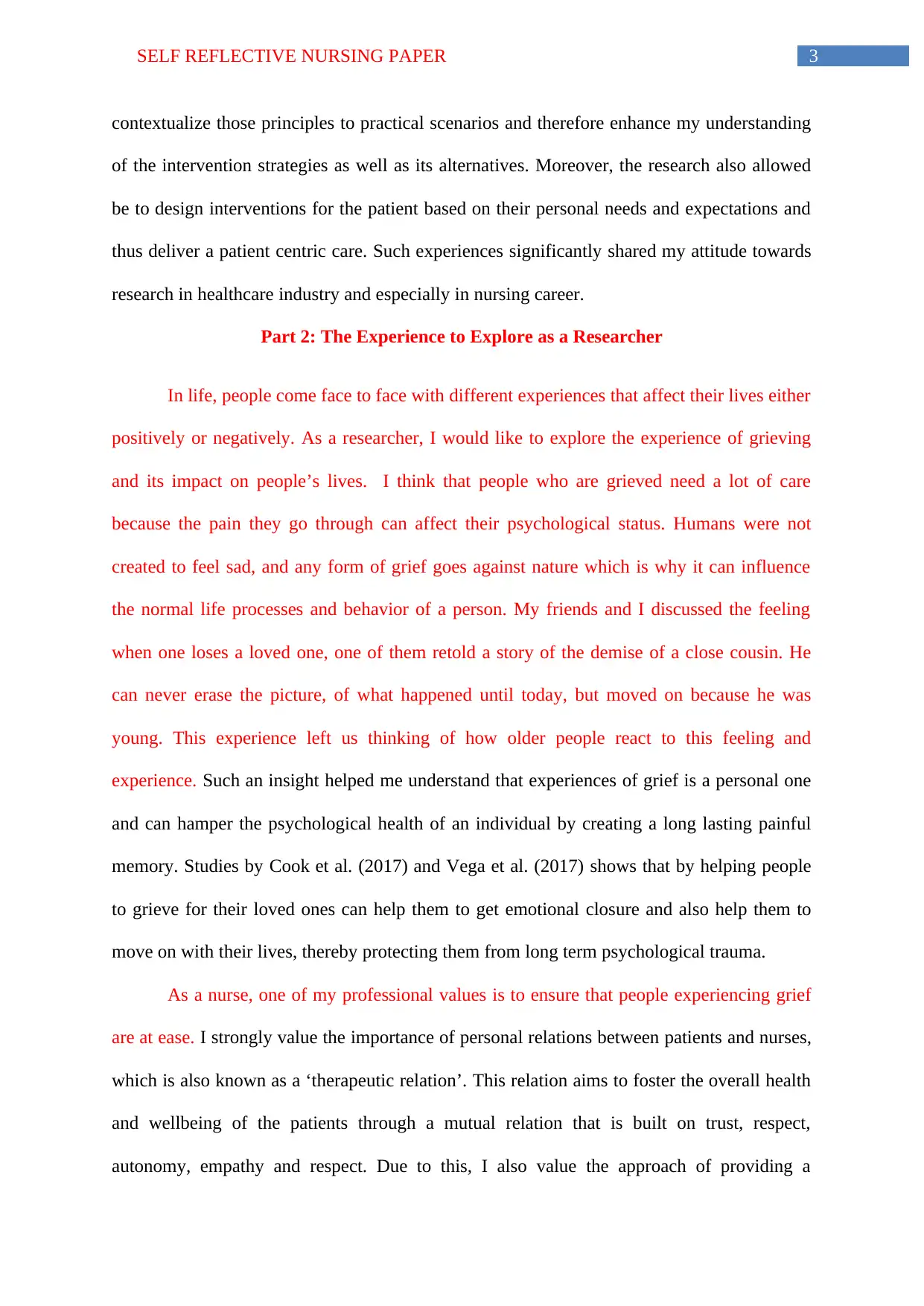
3SELF REFLECTIVE NURSING PAPER
contextualize those principles to practical scenarios and therefore enhance my understanding
of the intervention strategies as well as its alternatives. Moreover, the research also allowed
be to design interventions for the patient based on their personal needs and expectations and
thus deliver a patient centric care. Such experiences significantly shared my attitude towards
research in healthcare industry and especially in nursing career.
Part 2: The Experience to Explore as a Researcher
In life, people come face to face with different experiences that affect their lives either
positively or negatively. As a researcher, I would like to explore the experience of grieving
and its impact on people’s lives. I think that people who are grieved need a lot of care
because the pain they go through can affect their psychological status. Humans were not
created to feel sad, and any form of grief goes against nature which is why it can influence
the normal life processes and behavior of a person. My friends and I discussed the feeling
when one loses a loved one, one of them retold a story of the demise of a close cousin. He
can never erase the picture, of what happened until today, but moved on because he was
young. This experience left us thinking of how older people react to this feeling and
experience. Such an insight helped me understand that experiences of grief is a personal one
and can hamper the psychological health of an individual by creating a long lasting painful
memory. Studies by Cook et al. (2017) and Vega et al. (2017) shows that by helping people
to grieve for their loved ones can help them to get emotional closure and also help them to
move on with their lives, thereby protecting them from long term psychological trauma.
As a nurse, one of my professional values is to ensure that people experiencing grief
are at ease. I strongly value the importance of personal relations between patients and nurses,
which is also known as a ‘therapeutic relation’. This relation aims to foster the overall health
and wellbeing of the patients through a mutual relation that is built on trust, respect,
autonomy, empathy and respect. Due to this, I also value the approach of providing a
contextualize those principles to practical scenarios and therefore enhance my understanding
of the intervention strategies as well as its alternatives. Moreover, the research also allowed
be to design interventions for the patient based on their personal needs and expectations and
thus deliver a patient centric care. Such experiences significantly shared my attitude towards
research in healthcare industry and especially in nursing career.
Part 2: The Experience to Explore as a Researcher
In life, people come face to face with different experiences that affect their lives either
positively or negatively. As a researcher, I would like to explore the experience of grieving
and its impact on people’s lives. I think that people who are grieved need a lot of care
because the pain they go through can affect their psychological status. Humans were not
created to feel sad, and any form of grief goes against nature which is why it can influence
the normal life processes and behavior of a person. My friends and I discussed the feeling
when one loses a loved one, one of them retold a story of the demise of a close cousin. He
can never erase the picture, of what happened until today, but moved on because he was
young. This experience left us thinking of how older people react to this feeling and
experience. Such an insight helped me understand that experiences of grief is a personal one
and can hamper the psychological health of an individual by creating a long lasting painful
memory. Studies by Cook et al. (2017) and Vega et al. (2017) shows that by helping people
to grieve for their loved ones can help them to get emotional closure and also help them to
move on with their lives, thereby protecting them from long term psychological trauma.
As a nurse, one of my professional values is to ensure that people experiencing grief
are at ease. I strongly value the importance of personal relations between patients and nurses,
which is also known as a ‘therapeutic relation’. This relation aims to foster the overall health
and wellbeing of the patients through a mutual relation that is built on trust, respect,
autonomy, empathy and respect. Due to this, I also value the approach of providing a
Paraphrase This Document
Need a fresh take? Get an instant paraphrase of this document with our AI Paraphraser
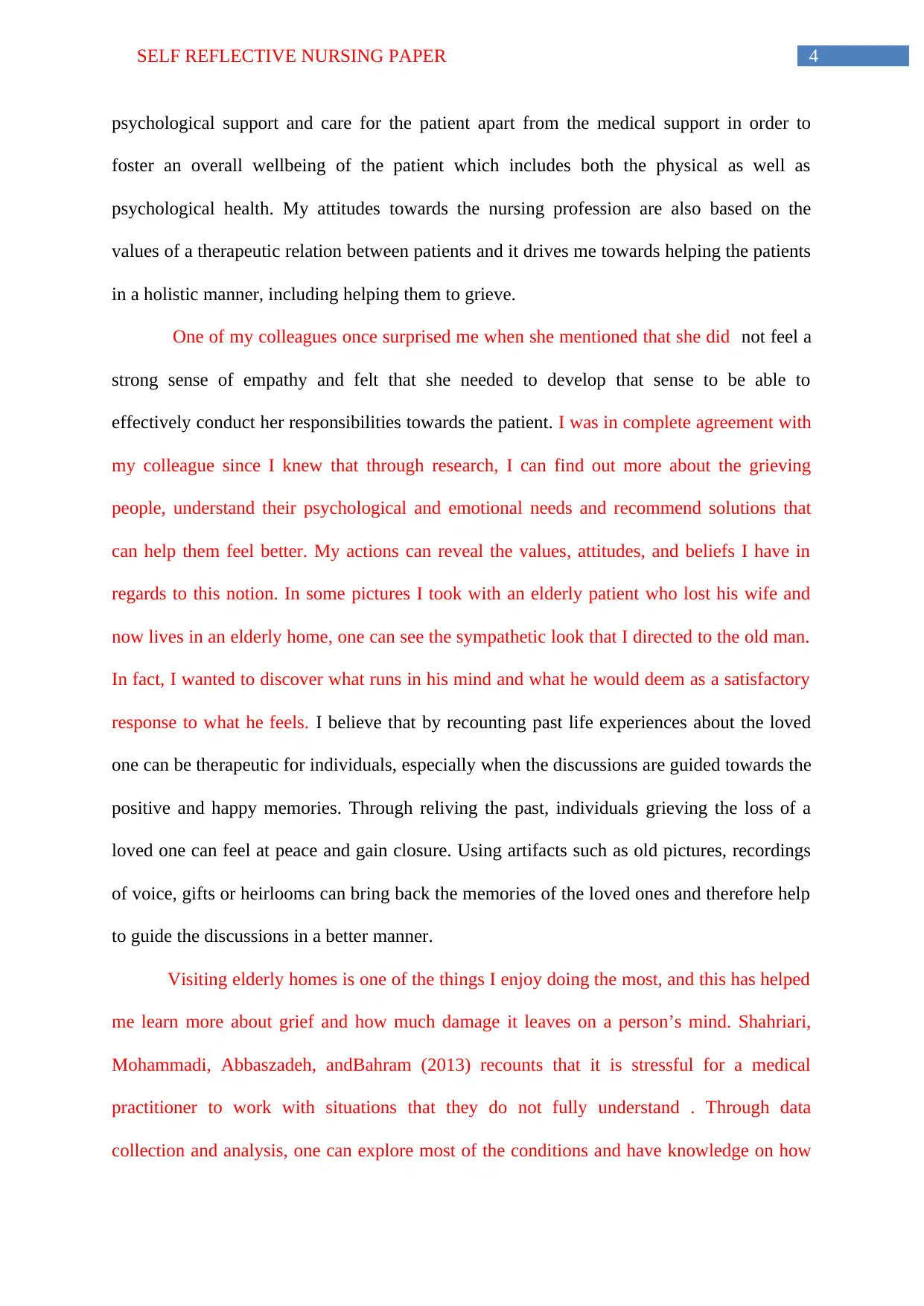
4SELF REFLECTIVE NURSING PAPER
psychological support and care for the patient apart from the medical support in order to
foster an overall wellbeing of the patient which includes both the physical as well as
psychological health. My attitudes towards the nursing profession are also based on the
values of a therapeutic relation between patients and it drives me towards helping the patients
in a holistic manner, including helping them to grieve.
One of my colleagues once surprised me when she mentioned that she did not feel a
strong sense of empathy and felt that she needed to develop that sense to be able to
effectively conduct her responsibilities towards the patient. I was in complete agreement with
my colleague since I knew that through research, I can find out more about the grieving
people, understand their psychological and emotional needs and recommend solutions that
can help them feel better. My actions can reveal the values, attitudes, and beliefs I have in
regards to this notion. In some pictures I took with an elderly patient who lost his wife and
now lives in an elderly home, one can see the sympathetic look that I directed to the old man.
In fact, I wanted to discover what runs in his mind and what he would deem as a satisfactory
response to what he feels. I believe that by recounting past life experiences about the loved
one can be therapeutic for individuals, especially when the discussions are guided towards the
positive and happy memories. Through reliving the past, individuals grieving the loss of a
loved one can feel at peace and gain closure. Using artifacts such as old pictures, recordings
of voice, gifts or heirlooms can bring back the memories of the loved ones and therefore help
to guide the discussions in a better manner.
Visiting elderly homes is one of the things I enjoy doing the most, and this has helped
me learn more about grief and how much damage it leaves on a person’s mind. Shahriari,
Mohammadi, Abbaszadeh, andBahram (2013) recounts that it is stressful for a medical
practitioner to work with situations that they do not fully understand . Through data
collection and analysis, one can explore most of the conditions and have knowledge on how
psychological support and care for the patient apart from the medical support in order to
foster an overall wellbeing of the patient which includes both the physical as well as
psychological health. My attitudes towards the nursing profession are also based on the
values of a therapeutic relation between patients and it drives me towards helping the patients
in a holistic manner, including helping them to grieve.
One of my colleagues once surprised me when she mentioned that she did not feel a
strong sense of empathy and felt that she needed to develop that sense to be able to
effectively conduct her responsibilities towards the patient. I was in complete agreement with
my colleague since I knew that through research, I can find out more about the grieving
people, understand their psychological and emotional needs and recommend solutions that
can help them feel better. My actions can reveal the values, attitudes, and beliefs I have in
regards to this notion. In some pictures I took with an elderly patient who lost his wife and
now lives in an elderly home, one can see the sympathetic look that I directed to the old man.
In fact, I wanted to discover what runs in his mind and what he would deem as a satisfactory
response to what he feels. I believe that by recounting past life experiences about the loved
one can be therapeutic for individuals, especially when the discussions are guided towards the
positive and happy memories. Through reliving the past, individuals grieving the loss of a
loved one can feel at peace and gain closure. Using artifacts such as old pictures, recordings
of voice, gifts or heirlooms can bring back the memories of the loved ones and therefore help
to guide the discussions in a better manner.
Visiting elderly homes is one of the things I enjoy doing the most, and this has helped
me learn more about grief and how much damage it leaves on a person’s mind. Shahriari,
Mohammadi, Abbaszadeh, andBahram (2013) recounts that it is stressful for a medical
practitioner to work with situations that they do not fully understand . Through data
collection and analysis, one can explore most of the conditions and have knowledge on how
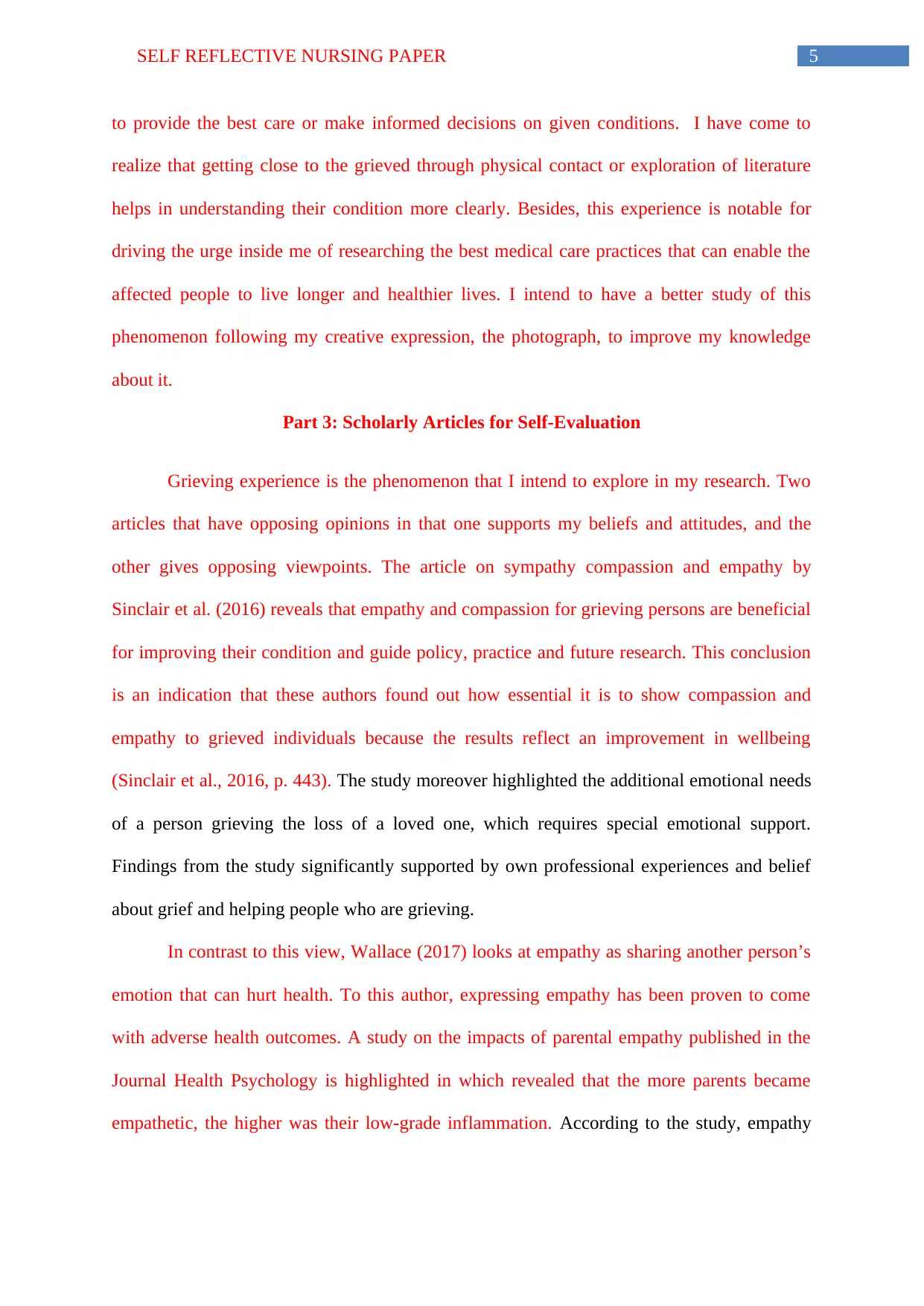
5SELF REFLECTIVE NURSING PAPER
to provide the best care or make informed decisions on given conditions. I have come to
realize that getting close to the grieved through physical contact or exploration of literature
helps in understanding their condition more clearly. Besides, this experience is notable for
driving the urge inside me of researching the best medical care practices that can enable the
affected people to live longer and healthier lives. I intend to have a better study of this
phenomenon following my creative expression, the photograph, to improve my knowledge
about it.
Part 3: Scholarly Articles for Self-Evaluation
Grieving experience is the phenomenon that I intend to explore in my research. Two
articles that have opposing opinions in that one supports my beliefs and attitudes, and the
other gives opposing viewpoints. The article on sympathy compassion and empathy by
Sinclair et al. (2016) reveals that empathy and compassion for grieving persons are beneficial
for improving their condition and guide policy, practice and future research. This conclusion
is an indication that these authors found out how essential it is to show compassion and
empathy to grieved individuals because the results reflect an improvement in wellbeing
(Sinclair et al., 2016, p. 443). The study moreover highlighted the additional emotional needs
of a person grieving the loss of a loved one, which requires special emotional support.
Findings from the study significantly supported by own professional experiences and belief
about grief and helping people who are grieving.
In contrast to this view, Wallace (2017) looks at empathy as sharing another person’s
emotion that can hurt health. To this author, expressing empathy has been proven to come
with adverse health outcomes. A study on the impacts of parental empathy published in the
Journal Health Psychology is highlighted in which revealed that the more parents became
empathetic, the higher was their low-grade inflammation. According to the study, empathy
to provide the best care or make informed decisions on given conditions. I have come to
realize that getting close to the grieved through physical contact or exploration of literature
helps in understanding their condition more clearly. Besides, this experience is notable for
driving the urge inside me of researching the best medical care practices that can enable the
affected people to live longer and healthier lives. I intend to have a better study of this
phenomenon following my creative expression, the photograph, to improve my knowledge
about it.
Part 3: Scholarly Articles for Self-Evaluation
Grieving experience is the phenomenon that I intend to explore in my research. Two
articles that have opposing opinions in that one supports my beliefs and attitudes, and the
other gives opposing viewpoints. The article on sympathy compassion and empathy by
Sinclair et al. (2016) reveals that empathy and compassion for grieving persons are beneficial
for improving their condition and guide policy, practice and future research. This conclusion
is an indication that these authors found out how essential it is to show compassion and
empathy to grieved individuals because the results reflect an improvement in wellbeing
(Sinclair et al., 2016, p. 443). The study moreover highlighted the additional emotional needs
of a person grieving the loss of a loved one, which requires special emotional support.
Findings from the study significantly supported by own professional experiences and belief
about grief and helping people who are grieving.
In contrast to this view, Wallace (2017) looks at empathy as sharing another person’s
emotion that can hurt health. To this author, expressing empathy has been proven to come
with adverse health outcomes. A study on the impacts of parental empathy published in the
Journal Health Psychology is highlighted in which revealed that the more parents became
empathetic, the higher was their low-grade inflammation. According to the study, empathy
⊘ This is a preview!⊘
Do you want full access?
Subscribe today to unlock all pages.

Trusted by 1+ million students worldwide
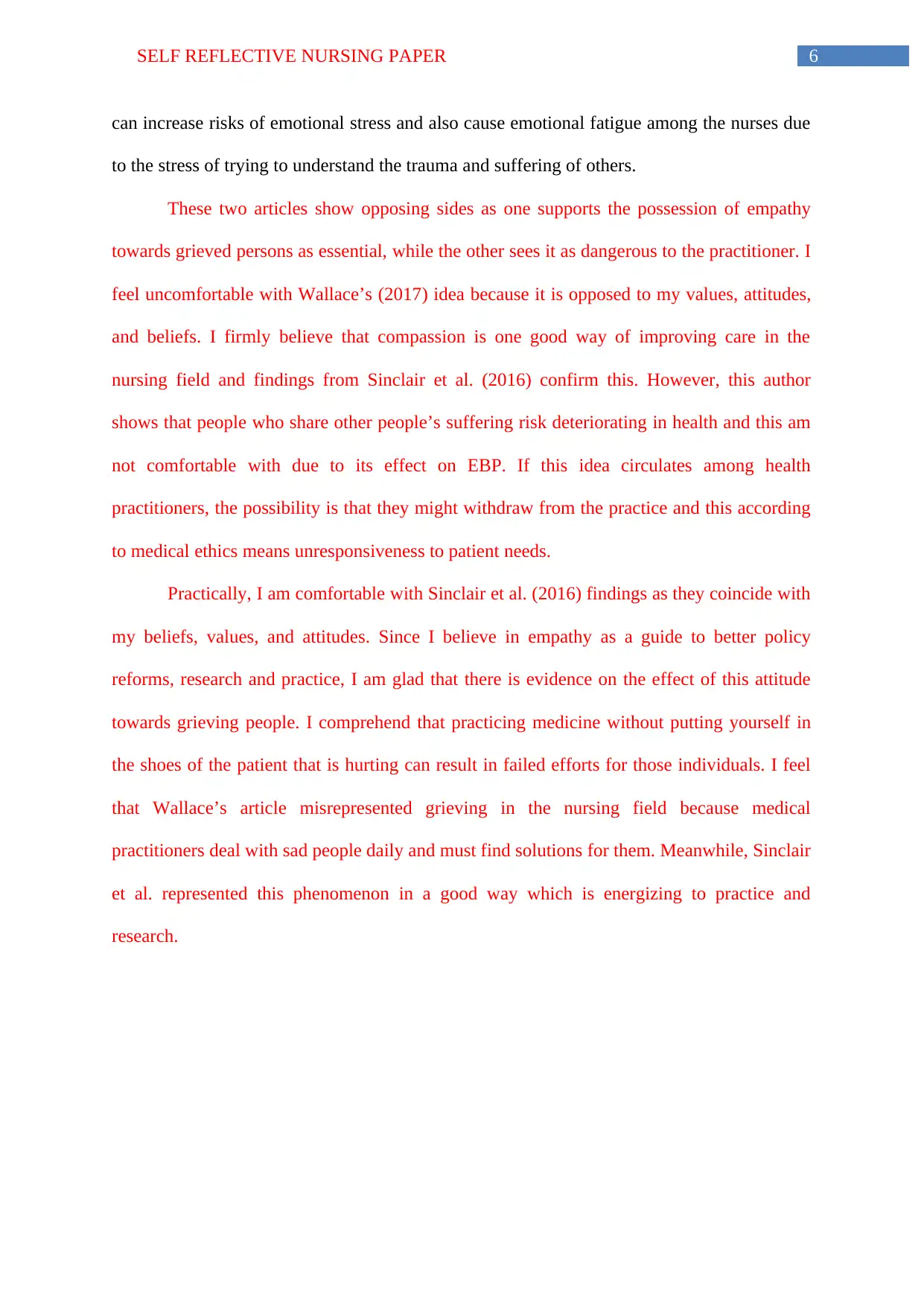
6SELF REFLECTIVE NURSING PAPER
can increase risks of emotional stress and also cause emotional fatigue among the nurses due
to the stress of trying to understand the trauma and suffering of others.
These two articles show opposing sides as one supports the possession of empathy
towards grieved persons as essential, while the other sees it as dangerous to the practitioner. I
feel uncomfortable with Wallace’s (2017) idea because it is opposed to my values, attitudes,
and beliefs. I firmly believe that compassion is one good way of improving care in the
nursing field and findings from Sinclair et al. (2016) confirm this. However, this author
shows that people who share other people’s suffering risk deteriorating in health and this am
not comfortable with due to its effect on EBP. If this idea circulates among health
practitioners, the possibility is that they might withdraw from the practice and this according
to medical ethics means unresponsiveness to patient needs.
Practically, I am comfortable with Sinclair et al. (2016) findings as they coincide with
my beliefs, values, and attitudes. Since I believe in empathy as a guide to better policy
reforms, research and practice, I am glad that there is evidence on the effect of this attitude
towards grieving people. I comprehend that practicing medicine without putting yourself in
the shoes of the patient that is hurting can result in failed efforts for those individuals. I feel
that Wallace’s article misrepresented grieving in the nursing field because medical
practitioners deal with sad people daily and must find solutions for them. Meanwhile, Sinclair
et al. represented this phenomenon in a good way which is energizing to practice and
research.
can increase risks of emotional stress and also cause emotional fatigue among the nurses due
to the stress of trying to understand the trauma and suffering of others.
These two articles show opposing sides as one supports the possession of empathy
towards grieved persons as essential, while the other sees it as dangerous to the practitioner. I
feel uncomfortable with Wallace’s (2017) idea because it is opposed to my values, attitudes,
and beliefs. I firmly believe that compassion is one good way of improving care in the
nursing field and findings from Sinclair et al. (2016) confirm this. However, this author
shows that people who share other people’s suffering risk deteriorating in health and this am
not comfortable with due to its effect on EBP. If this idea circulates among health
practitioners, the possibility is that they might withdraw from the practice and this according
to medical ethics means unresponsiveness to patient needs.
Practically, I am comfortable with Sinclair et al. (2016) findings as they coincide with
my beliefs, values, and attitudes. Since I believe in empathy as a guide to better policy
reforms, research and practice, I am glad that there is evidence on the effect of this attitude
towards grieving people. I comprehend that practicing medicine without putting yourself in
the shoes of the patient that is hurting can result in failed efforts for those individuals. I feel
that Wallace’s article misrepresented grieving in the nursing field because medical
practitioners deal with sad people daily and must find solutions for them. Meanwhile, Sinclair
et al. represented this phenomenon in a good way which is energizing to practice and
research.
Paraphrase This Document
Need a fresh take? Get an instant paraphrase of this document with our AI Paraphraser
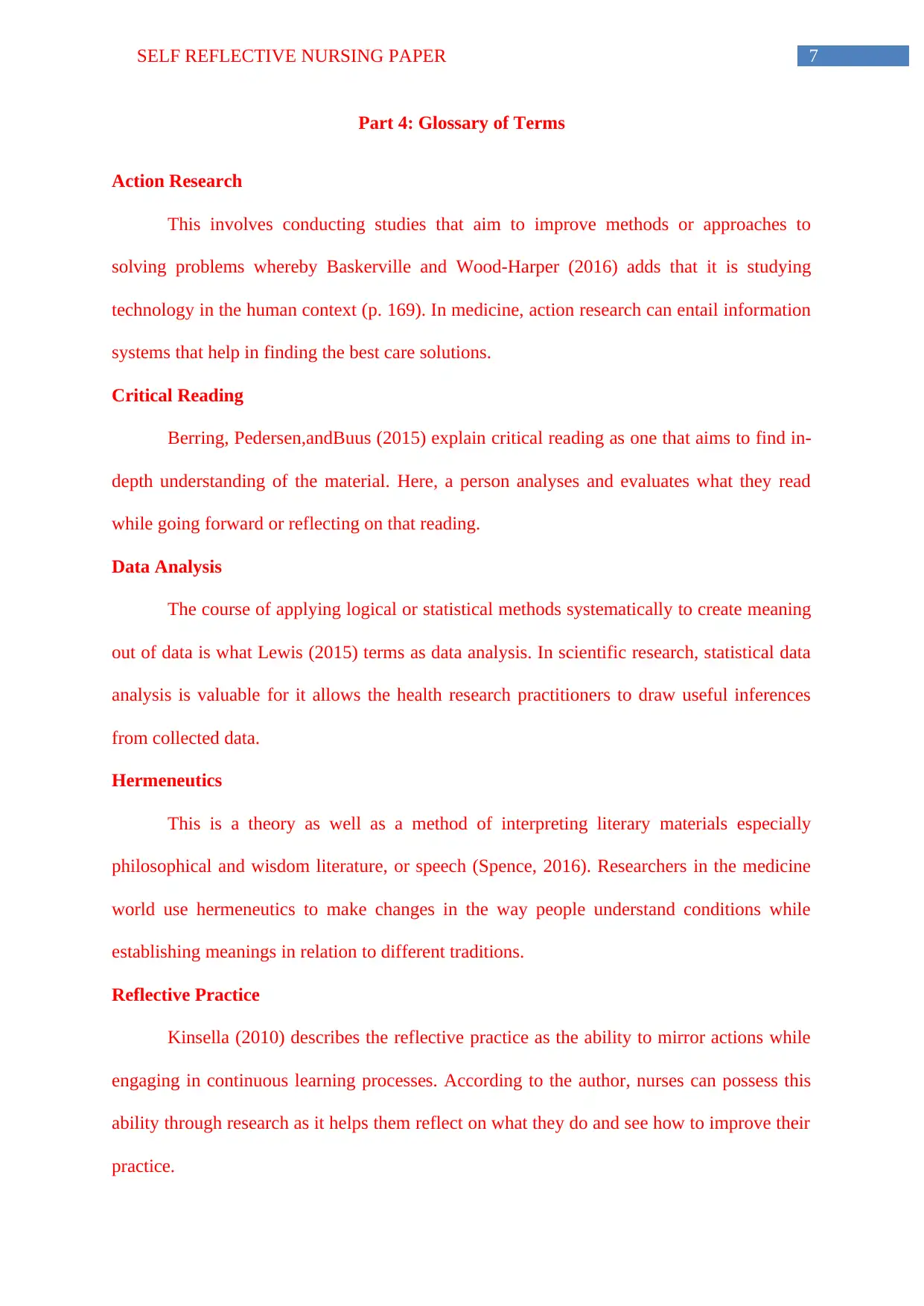
7SELF REFLECTIVE NURSING PAPER
Part 4: Glossary of Terms
Action Research
This involves conducting studies that aim to improve methods or approaches to
solving problems whereby Baskerville and Wood-Harper (2016) adds that it is studying
technology in the human context (p. 169). In medicine, action research can entail information
systems that help in finding the best care solutions.
Critical Reading
Berring, Pedersen,andBuus (2015) explain critical reading as one that aims to find in-
depth understanding of the material. Here, a person analyses and evaluates what they read
while going forward or reflecting on that reading.
Data Analysis
The course of applying logical or statistical methods systematically to create meaning
out of data is what Lewis (2015) terms as data analysis. In scientific research, statistical data
analysis is valuable for it allows the health research practitioners to draw useful inferences
from collected data.
Hermeneutics
This is a theory as well as a method of interpreting literary materials especially
philosophical and wisdom literature, or speech (Spence, 2016). Researchers in the medicine
world use hermeneutics to make changes in the way people understand conditions while
establishing meanings in relation to different traditions.
Reflective Practice
Kinsella (2010) describes the reflective practice as the ability to mirror actions while
engaging in continuous learning processes. According to the author, nurses can possess this
ability through research as it helps them reflect on what they do and see how to improve their
practice.
Part 4: Glossary of Terms
Action Research
This involves conducting studies that aim to improve methods or approaches to
solving problems whereby Baskerville and Wood-Harper (2016) adds that it is studying
technology in the human context (p. 169). In medicine, action research can entail information
systems that help in finding the best care solutions.
Critical Reading
Berring, Pedersen,andBuus (2015) explain critical reading as one that aims to find in-
depth understanding of the material. Here, a person analyses and evaluates what they read
while going forward or reflecting on that reading.
Data Analysis
The course of applying logical or statistical methods systematically to create meaning
out of data is what Lewis (2015) terms as data analysis. In scientific research, statistical data
analysis is valuable for it allows the health research practitioners to draw useful inferences
from collected data.
Hermeneutics
This is a theory as well as a method of interpreting literary materials especially
philosophical and wisdom literature, or speech (Spence, 2016). Researchers in the medicine
world use hermeneutics to make changes in the way people understand conditions while
establishing meanings in relation to different traditions.
Reflective Practice
Kinsella (2010) describes the reflective practice as the ability to mirror actions while
engaging in continuous learning processes. According to the author, nurses can possess this
ability through research as it helps them reflect on what they do and see how to improve their
practice.
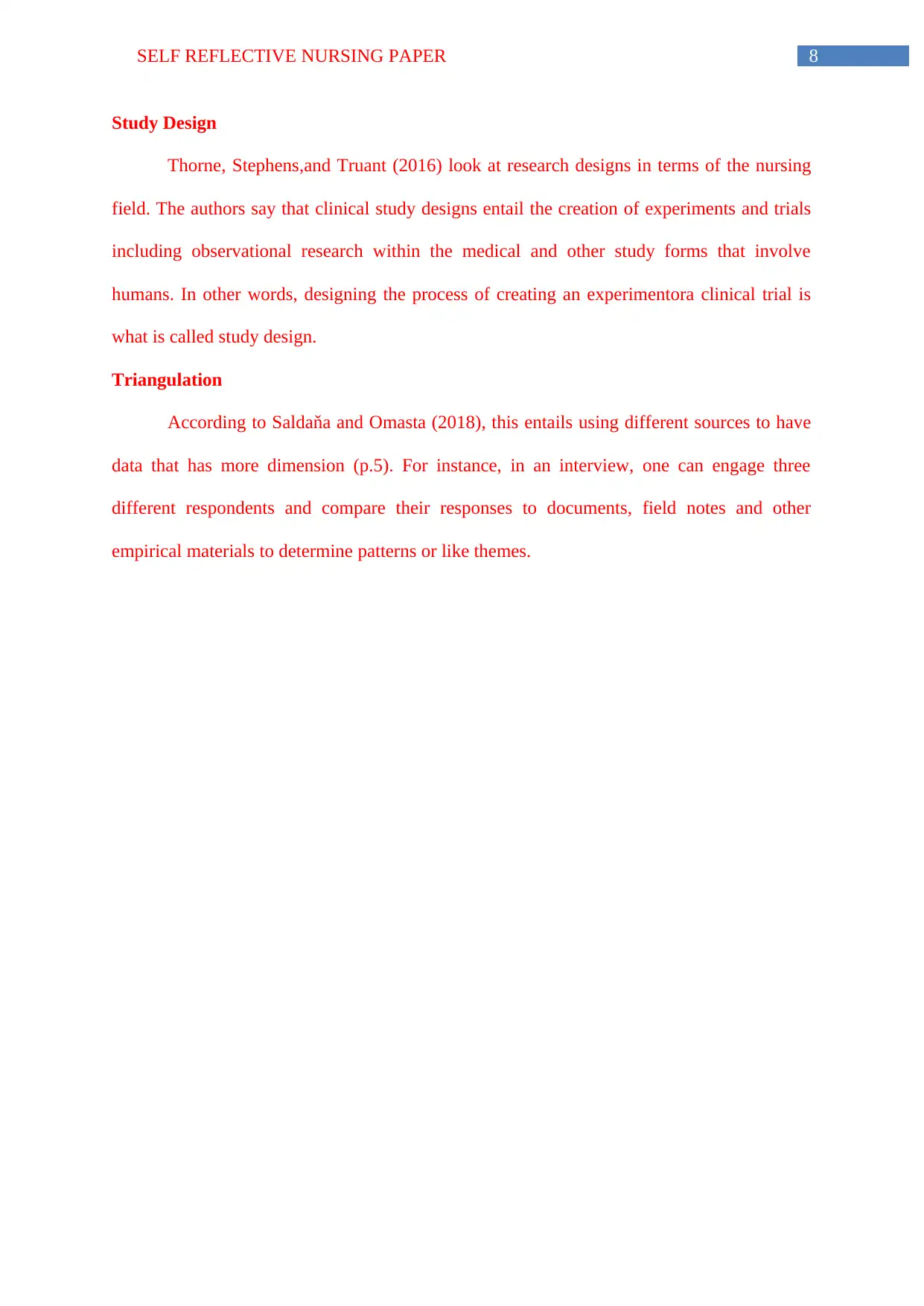
8SELF REFLECTIVE NURSING PAPER
Study Design
Thorne, Stephens,and Truant (2016) look at research designs in terms of the nursing
field. The authors say that clinical study designs entail the creation of experiments and trials
including observational research within the medical and other study forms that involve
humans. In other words, designing the process of creating an experimentora clinical trial is
what is called study design.
Triangulation
According to Saldaňa and Omasta (2018), this entails using different sources to have
data that has more dimension (p.5). For instance, in an interview, one can engage three
different respondents and compare their responses to documents, field notes and other
empirical materials to determine patterns or like themes.
Study Design
Thorne, Stephens,and Truant (2016) look at research designs in terms of the nursing
field. The authors say that clinical study designs entail the creation of experiments and trials
including observational research within the medical and other study forms that involve
humans. In other words, designing the process of creating an experimentora clinical trial is
what is called study design.
Triangulation
According to Saldaňa and Omasta (2018), this entails using different sources to have
data that has more dimension (p.5). For instance, in an interview, one can engage three
different respondents and compare their responses to documents, field notes and other
empirical materials to determine patterns or like themes.
⊘ This is a preview!⊘
Do you want full access?
Subscribe today to unlock all pages.

Trusted by 1+ million students worldwide
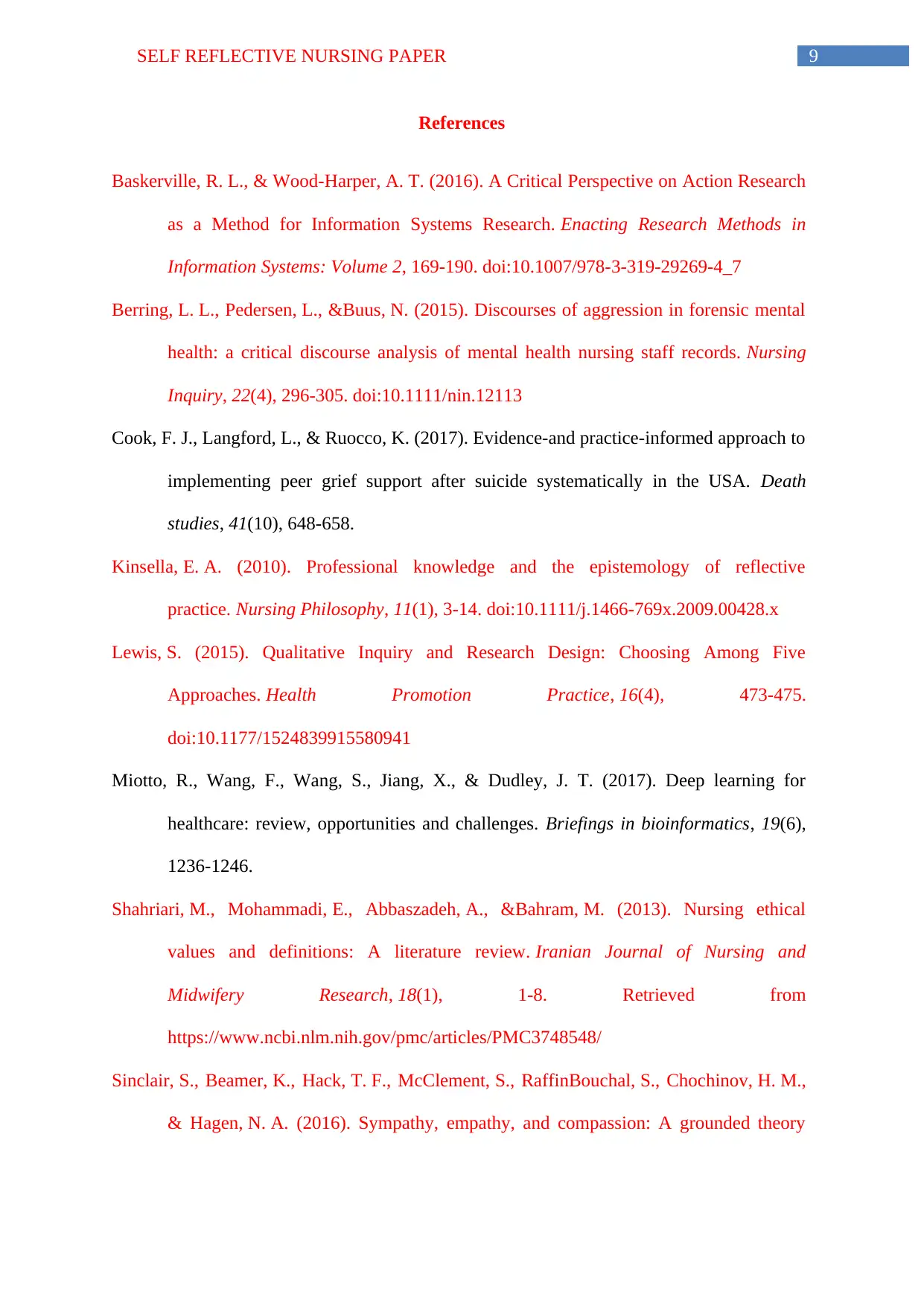
9SELF REFLECTIVE NURSING PAPER
References
Baskerville, R. L., & Wood-Harper, A. T. (2016). A Critical Perspective on Action Research
as a Method for Information Systems Research. Enacting Research Methods in
Information Systems: Volume 2, 169-190. doi:10.1007/978-3-319-29269-4_7
Berring, L. L., Pedersen, L., &Buus, N. (2015). Discourses of aggression in forensic mental
health: a critical discourse analysis of mental health nursing staff records. Nursing
Inquiry, 22(4), 296-305. doi:10.1111/nin.12113
Cook, F. J., Langford, L., & Ruocco, K. (2017). Evidence-and practice-informed approach to
implementing peer grief support after suicide systematically in the USA. Death
studies, 41(10), 648-658.
Kinsella, E. A. (2010). Professional knowledge and the epistemology of reflective
practice. Nursing Philosophy, 11(1), 3-14. doi:10.1111/j.1466-769x.2009.00428.x
Lewis, S. (2015). Qualitative Inquiry and Research Design: Choosing Among Five
Approaches. Health Promotion Practice, 16(4), 473-475.
doi:10.1177/1524839915580941
Miotto, R., Wang, F., Wang, S., Jiang, X., & Dudley, J. T. (2017). Deep learning for
healthcare: review, opportunities and challenges. Briefings in bioinformatics, 19(6),
1236-1246.
Shahriari, M., Mohammadi, E., Abbaszadeh, A., &Bahram, M. (2013). Nursing ethical
values and definitions: A literature review. Iranian Journal of Nursing and
Midwifery Research, 18(1), 1-8. Retrieved from
https://www.ncbi.nlm.nih.gov/pmc/articles/PMC3748548/
Sinclair, S., Beamer, K., Hack, T. F., McClement, S., RaffinBouchal, S., Chochinov, H. M.,
& Hagen, N. A. (2016). Sympathy, empathy, and compassion: A grounded theory
References
Baskerville, R. L., & Wood-Harper, A. T. (2016). A Critical Perspective on Action Research
as a Method for Information Systems Research. Enacting Research Methods in
Information Systems: Volume 2, 169-190. doi:10.1007/978-3-319-29269-4_7
Berring, L. L., Pedersen, L., &Buus, N. (2015). Discourses of aggression in forensic mental
health: a critical discourse analysis of mental health nursing staff records. Nursing
Inquiry, 22(4), 296-305. doi:10.1111/nin.12113
Cook, F. J., Langford, L., & Ruocco, K. (2017). Evidence-and practice-informed approach to
implementing peer grief support after suicide systematically in the USA. Death
studies, 41(10), 648-658.
Kinsella, E. A. (2010). Professional knowledge and the epistemology of reflective
practice. Nursing Philosophy, 11(1), 3-14. doi:10.1111/j.1466-769x.2009.00428.x
Lewis, S. (2015). Qualitative Inquiry and Research Design: Choosing Among Five
Approaches. Health Promotion Practice, 16(4), 473-475.
doi:10.1177/1524839915580941
Miotto, R., Wang, F., Wang, S., Jiang, X., & Dudley, J. T. (2017). Deep learning for
healthcare: review, opportunities and challenges. Briefings in bioinformatics, 19(6),
1236-1246.
Shahriari, M., Mohammadi, E., Abbaszadeh, A., &Bahram, M. (2013). Nursing ethical
values and definitions: A literature review. Iranian Journal of Nursing and
Midwifery Research, 18(1), 1-8. Retrieved from
https://www.ncbi.nlm.nih.gov/pmc/articles/PMC3748548/
Sinclair, S., Beamer, K., Hack, T. F., McClement, S., RaffinBouchal, S., Chochinov, H. M.,
& Hagen, N. A. (2016). Sympathy, empathy, and compassion: A grounded theory
Paraphrase This Document
Need a fresh take? Get an instant paraphrase of this document with our AI Paraphraser
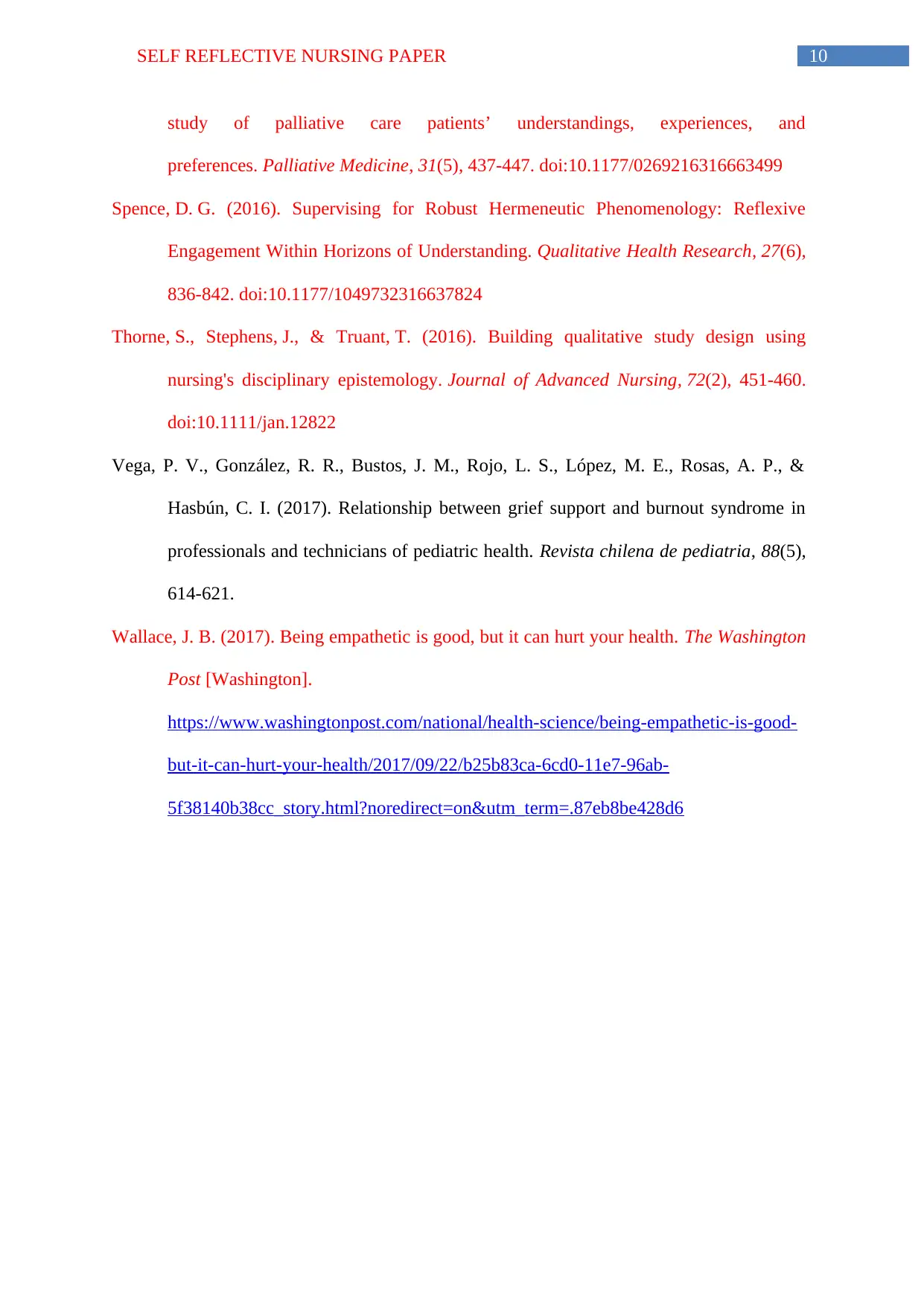
10SELF REFLECTIVE NURSING PAPER
study of palliative care patients’ understandings, experiences, and
preferences. Palliative Medicine, 31(5), 437-447. doi:10.1177/0269216316663499
Spence, D. G. (2016). Supervising for Robust Hermeneutic Phenomenology: Reflexive
Engagement Within Horizons of Understanding. Qualitative Health Research, 27(6),
836-842. doi:10.1177/1049732316637824
Thorne, S., Stephens, J., & Truant, T. (2016). Building qualitative study design using
nursing's disciplinary epistemology. Journal of Advanced Nursing, 72(2), 451-460.
doi:10.1111/jan.12822
Vega, P. V., González, R. R., Bustos, J. M., Rojo, L. S., López, M. E., Rosas, A. P., &
Hasbún, C. I. (2017). Relationship between grief support and burnout syndrome in
professionals and technicians of pediatric health. Revista chilena de pediatria, 88(5),
614-621.
Wallace, J. B. (2017). Being empathetic is good, but it can hurt your health. The Washington
Post [Washington].
https://www.washingtonpost.com/national/health-science/being-empathetic-is-good-
but-it-can-hurt-your-health/2017/09/22/b25b83ca-6cd0-11e7-96ab-
5f38140b38cc_story.html?noredirect=on&utm_term=.87eb8be428d6
study of palliative care patients’ understandings, experiences, and
preferences. Palliative Medicine, 31(5), 437-447. doi:10.1177/0269216316663499
Spence, D. G. (2016). Supervising for Robust Hermeneutic Phenomenology: Reflexive
Engagement Within Horizons of Understanding. Qualitative Health Research, 27(6),
836-842. doi:10.1177/1049732316637824
Thorne, S., Stephens, J., & Truant, T. (2016). Building qualitative study design using
nursing's disciplinary epistemology. Journal of Advanced Nursing, 72(2), 451-460.
doi:10.1111/jan.12822
Vega, P. V., González, R. R., Bustos, J. M., Rojo, L. S., López, M. E., Rosas, A. P., &
Hasbún, C. I. (2017). Relationship between grief support and burnout syndrome in
professionals and technicians of pediatric health. Revista chilena de pediatria, 88(5),
614-621.
Wallace, J. B. (2017). Being empathetic is good, but it can hurt your health. The Washington
Post [Washington].
https://www.washingtonpost.com/national/health-science/being-empathetic-is-good-
but-it-can-hurt-your-health/2017/09/22/b25b83ca-6cd0-11e7-96ab-
5f38140b38cc_story.html?noredirect=on&utm_term=.87eb8be428d6
1 out of 11
Related Documents
Your All-in-One AI-Powered Toolkit for Academic Success.
+13062052269
info@desklib.com
Available 24*7 on WhatsApp / Email
![[object Object]](/_next/static/media/star-bottom.7253800d.svg)
Unlock your academic potential
Copyright © 2020–2026 A2Z Services. All Rights Reserved. Developed and managed by ZUCOL.





